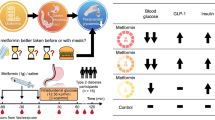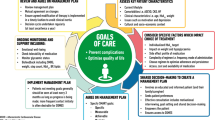Abstract
Taking metformin with a meal has been shown to decrease bioavailability of metformin. We hypothesized that taking metformin 30 min before a meal improves glucose metabolism. As an animal model, 18 Zucker-rats were divided into three groups as follows: no medication (Control), metformin (600 mg/kg) with meal (Met), and metformin 10 min before meal (pre-Met). In addition, five diabetic patients were recruited and randomized to take metformin (1000 mg) either 30 min before a meal (pre-Met protocol) or with a meal (Met protocol). In the animal model, the peak glucose level of pre-Met (7.8 ± 1.5 mmol/L) was lower than that of Control (12.6 ± 2.5 mmol/L, P = 0.010) or Met (14.1 ± 2.9 mmol/L, P = 0.020). Although there was no statistical difference among the three groups, total GLP-1 level at t = 0 min of pre-Met (7.4 ± 2.7 pmol/L) tended to be higher than that of Control (3.7 ± 2.0 pmol/L, P = 0.030) or Met (3.9 ± 1.2 pmol/L, P = 0.020). In diabetic patients, the peak glucose level of pre-Met protocol (7.0 ± 0.4 mmol/L) was lower than that of Met protocol (8.5 ± 0.9 mmol/L, P = 0.021). Total GLP-1 level at t = 30 min of pre-Met protocol (11.0 ± 6.1 pmol/L) was higher than that of Met protocol (6.7 ± 3.9 pmol/L, P = 0.033). Taking metformin 30 min before a meal ameliorated postprandial hyperglycemia. This promises to be a novel approach for postprandial hyperglycemia.



Similar content being viewed by others
Abbreviations
- GLP-1:
-
Glucagon-like peptide-1
- DPP-4:
-
Dipeptidyl peptidase 4
- Control:
-
No medication
- Met:
-
Taking metformin (600 mg/kg) with meal
- pre-Met:
-
Taking metformin 10 min before meal
- pre-Met protocol:
-
Taking metformin (1000 mg) 30 min before a meal
- Met protocol:
-
Taking metformin (1000 mg) with a meal
References
M.A. Espeland, H.A. Glick, A. Bertoni, F.L. Brancati, G.A. Bray, J.M. Clark, J.M. Curtis, C. Egan, M. Evans, J.P. Foreyt, S. Ghazarian, E.W. Gregg, H.P. Hazuda, J.O. Hill, D. Hire, E.S. Horton, V.S. Hubbard, J.M. Jakicic, R.W. Jeffery, K.C. Johnson, S.E. Kahn, T. Killean, A.E. Kitabchi, W.C. Knowler, A. Kriska, C.E. Lewis, M. Miller, M.G. Montez, A. Murillo, D.M. Nathan, E. Nyenwe, J. Patricio, A.L. Peters, X. Pi-Sunyer, H. Pownall, J.B. Redmon, J. Rushing, D.H. Ryan, M. Safford, A.G. Tsai, T.A. Wadden, R.R. Wing, S.Z. Yanovski, P. Zhang, Look AHEAD Research Group, Impact of an intensive lifestyle intervention on use and cost of medical services among overweight and obese adults with type 2 diabetes: the action for health in diabetes. Diabetes Care 37, 2548–2556 (2014)
M. Tominaga, H. Eguchi, H. Manaka, K. Igarashi, T. Kato, A. Sekikawa, Impaired glucose tolerance is a risk factor for cardiovascular disease, but not impaired fasting glucose. The Funagata Diabetes Study. Diabetes Care 22, 920–924 (1999)
T. Nakagami, Hyperglycaemia and mortality from all causes and from cardiovascular disease in five populations of Asian origin. Diabetologia 47, 385–394 (2004)
F. Fehse, M. Trautmann, J.J. Holst, A.E. Halseth, N. Nanayakkara, L.L. Nielsen, M.S. Fineman, D.D. Kim, M.A. Nauck, Exenatide augments first- and second-phase insulin secretion in response to intravenous glucose in subjects with type 2 diabetes. J. Clin. Endocrinol. Metab. 90, 5991–5997 (2005)
B. Balas, M.R. Baig, C. Watson, B.E. Dunning, M. Ligueros-Saylan, Y. Wang, Y.L. He, C. Darland, J.J. Holst, C.F. Deacon, K. Cusi, A. Mari, J.E. Foley, R.A. DeFronzo, The dipeptidyl peptidase IV inhibitor vildagliptin suppresses endogenous glucose production and enhances islet function after single-dose administration in type 2 diabetic patients. J. Clin. Endocrinol. Metab. 92, 1249–1255 (2007)
D. Kirpichnikov, S.I. McFarlane, J.R. Sowers, Metformin: an update. Ann. Intern. Med. 137, 25–33 (2002)
S.E. Inzucchi, R.M. Bergenstal, J.B. Buse, M. Diamant, E. Ferrannini, M. Nauck, A.L. Peters, A. Tsapas, R. Wender, D.R. Matthews, Management of hyperglycaemia in type 2 diabetes, 2015: a patient-centred approach. Update to a position statement of the American Diabetes Association and the European Association for the Study of Diabetes. Diabetologia 58, 429–442 (2015)
E. Mannucci, A. Ognibene, F. Cremasco, G. Bardini, A. Mencucci, E. Pierazzuoli, S. Ciani, G. Messeri, C.M. Rotella, Effect of metformin on glucagon-like peptide 1 (GLP-1) and leptin levels in obese nondiabetic subjects. Diabetes Care 24, 489–494 (2001)
B.D. Green, N. Irwin, N.A. Duffy, V.A. Gault, F.P. O’harte, P.R. Flatt, Inhibition of dipeptidyl peptidase-IV activity by metformin enhances the antidiabetic effects of glucagon-like peptide-1. Eur. J. Pharmacol. 547, 192–199 (2006)
N.C. Sambol, L.G. Brookes, J. Chiang, A.M. Goodman, E.T. Lin, C.Y. Liu, L.Z. Benet, Food intake and dosage level, but not tablet vs solution dosage form, affect the absorption of metformin HCl in man. Br. J. Clin. Pharmacol. 42, 510–512 (1996)
Y. Urita, K. Hike, N. Torii, Y. Kikuchi, M. Sasajima, K. Miki, Efficacy of lactulose plus 13C-acetate breath test in the diagnosis of gastrointestinal motility disorders. J. Gastroenterol. 37, 442–448 (2002)
C. Kapitza, T. Forst, H.V. Coester, F. Poitiers, P. Ruus, A. Hincelin-Méry, Pharmacodynamic characteristics of lixisenatide once daily versus liraglutide once daily in patients with type 2 diabetes insufficiently controlled on metformin. Diabetes Obes. Metab. 15, 642–649 (2013)
J. Gagnon, E. Sheppard, Y. Anini, Metformin directly inhibits ghrelin secretion through AMP-activated protein kinase in rat primary gastric cells. Diabetes Obes. Metab. 15, 276–279 (2013)
Y. Masuda, T. Tanaka, N. Inomata, N. Ohnuma, S. Tanaka, Z. Itoh, H. Hosoda, M. Kojima, K. Kangawa, Ghrelin stimulates gastric acid secretion and motility in rats. Biochem. Biophys. Res. Commun. 276, 905–908 (2000)
J.J. Meier, G. Kemmeries, J.J. Holst, M.A. Nauck, Erythromycin antagonizes the deceleration of gastric emptying by glucagon-like peptide 1 and unmasks its insulinotropic effect in healthy subjects. Diabetes 54, 2212–2218 (2005)
A.J. Lee, Metformin in noninsulin-dependent diabetes mellitus. Pharmacotherapy 16, 327–351 (1996)
J. Borovicka, C. Kreiss, K. Asal, B. Remy, C. Mettraux, A. Wells, N.W. Read, J.B. Jansen, M. D’Amato, A.B. Delaloye, M. Fried, W. Schwizer, Role of cholecystokinin as a regulator of solid and liquid gastric emptying in humans. Am. J. Physiol. 271, G448–G453 (1996)
F.H. Weber Jr, R.D. Richards, R.W. McCallum, Erythromycin: a motilin agonist and gastrointestinal prokinetic agent. Am. J. Gastroenterol. 88, 485–490 (1993)
J.M. Trujillo, W. Nuffer, GLP-1 receptor agonists for type 2 diabetes mellitus: recent developments and emerging agents. Pharmacotherapy 34, 1174–1186 (2014)
N. Mikhail, Effects of incretin-based therapy in patients with heart failure and myocardial infarction. Endocrine 47, 21–28 (2014)
Author contributions
Y.H. originated and designed the study, researched data, and wrote manuscript. M.T. originated and designed the study, researched data, contributed to discussion, and reviewed the manuscript. H.O., K.M., T.K., N.K., T.F., S.M., Y.F., Y.T., S.Y., T.S., M.H., M.A., M.Y., Y.O., and G.H. researched data and contributed to discussion. N.N. and M.F. researched data and reviewed and edited the manuscript. M.F. is the guarantor of this work and, as such, had full access to all the data in the study and takes responsibility for the integrity of the data and the accuracy of the data analysis. All authors critically reviewed the article and approved the final version of the manuscript.
Author information
Authors and Affiliations
Corresponding author
Ethics declarations
Conflict of interest
No potential conflict of interest relevant to this article was reported.
Rights and permissions
About this article
Cite this article
Hashimoto, Y., Tanaka, M., Okada, H. et al. Postprandial hyperglycemia was ameliorated by taking metformin 30 min before a meal than taking metformin with a meal; a randomized, open-label, crossover pilot study. Endocrine 52, 271–276 (2016). https://doi.org/10.1007/s12020-015-0786-4
Received:
Accepted:
Published:
Issue Date:
DOI: https://doi.org/10.1007/s12020-015-0786-4




